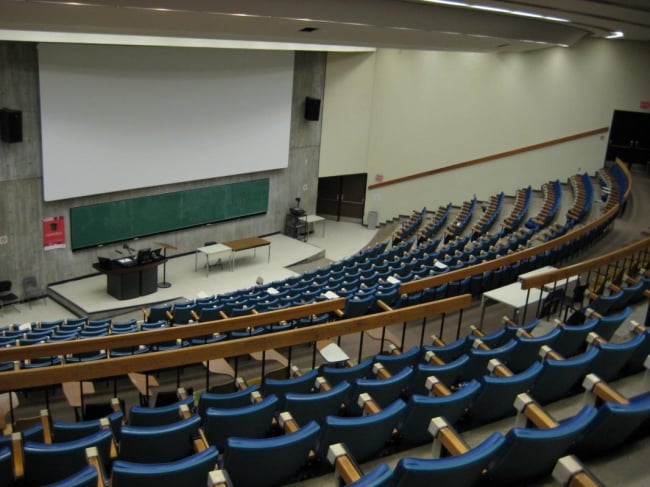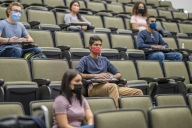You have /5 articles left.
Sign up for a free account or log in.

Wikimedia Commons/Theonlysilentbob
The talk around what college is going to look like in the fall is still, for now, just talk. The difficult calls have not been made, those hard-to-send emails have not been sent. The question of whether campuses will be closed to students is still in many ways an open one.
But every day the picture gets clearer. Some universities, if they have not made firm decisions, have indicated where they're leaning.
Two universities in the California State University system, San José State and Cal State Fullerton, have been open about considering and planning for a fall semester online. Though officials at those colleges have emphasized that nothing is set in stone, they are getting everything in order for a possible virtual semester.
The opposite is true at some other universities, which have said that they are preparing for a semester on campus. Purdue University president Mitch Daniels sent a letter to the university's constituents this week explaining that the administration is looking at separating people by age and vulnerability and limiting class sizes in the fall.
He did not mention the possibility of a fully online semester and said that the virus poses a near "zero lethal threat" to the under-35 age group, which makes up 80 percent of the total community.
William Jewell College in Missouri similarly announced that the administration is planning for an on-campus semester.
One reason for the differences in messaging might be location. Fullerton and San José are in some of the most populous metropolitan areas in the country. West Lafayette, Ind., and Liberty, Mo., are much less dense.
Chuck Staben, former president of the University of Idaho, said that institutions like Purdue and his own may be more likely to emphasize a face-to-face start.
"A residential campus like the University of Idaho that's in a fairly isolated location depends so much on really bringing students to that location," he said. "They're going to try very hard to have a face-to-face semester."
Staben noted that public and private colleges may also have different pressures.
"Private institutions, of course, aside from maybe the very top ones, are extremely tuition dependent. I think they will be under a lot of pressure to have face-to-face classes rather than online classes, because I think we're seeing student dissatisfaction with paying normal tuition for online classes," he said. "The higher the tuition, probably the greater that level of dissatisfaction."
Some in higher ed have suggested that there are many potential scenarios for the fall. Joshua Kim and Edward Maloney, teaching and learning specialists at Dartmouth College and Georgetown University, respectively, explored 15 of them in a blog post for Inside Higher Ed this week. Their list included a hybrid semester, a delayed start (like Macalester College has considered) or a block plan (which Beloit College and Centre College have already announced).
A survey from the American Association of Collegiate Registrars and Admissions Officers suggested that 16 to 21 percent of institutions are considering a delayed start to the semester. Earlier this month, Georgetown told its continuing M.B.A. students that their semester would be pushed back two weeks, from Aug. 26 to Sept. 14.
Kim and Maloney noted that some universities may consider not holding the fall semester at all and reopening in 2021, as Stanford University has openly considered. At other universities, such as Cleveland State University, officials have said that is not on the table.
Staben said that a complete fall closure won't be possible for most universities with tenure-track faculty members who need to be paid.
"It's extremely difficult to even think about 15 different scenarios," he said. "My thinking as a former president would be you need to think of two or three scenarios that seem reasonably likely and perhaps try to plan for those."
Harvey Kesselman, president of Stockton University, in New Jersey, echoed that thinking. He said the college is really only considering an online semester, a completely normal semester or an in-person semester with some adjustments.
Kesselman emphasized that there is only so much planning that can occur internally.
"If [the governor of New Jersey] were to say, 'No, we're going to continue students learning remotely,' it really wouldn't matter what we said."
The urban-rural division that Staben contemplated isn't the only one that could unfold. With governors sometimes taking radically different approaches to the virus response, it's possible that the politics of a state could affect its opening. Southern states with Republican governors, such as Georgia, have been pursuing aggressive reopening plans in the hopes of limiting economic damage.
Pressure to Make a Decision
While colleges still have four months until the traditional start to the semester, and most have indicated that they are comfortable waiting, there is some pressure from incoming and prospective students to make a firm decision soon.
Low yields and declining rates at which students are completing the federal financial aid application indicate that many students may be rethinking their college decisions or sitting on the fence. Loss of income may mean a decreased ability to pay for college. For the more fortunate, the possibility of a virtual semester may mean not getting the college experience they envisioned.
Of course, all this could spell disaster for colleges, which have forecast catastrophic losses and responded with hiring freezes and pay cuts. The University of Arizona, which has said it is planning on a return to campus, said it's expecting to lose $250 million from the pandemic.
Staben said the University of Idaho is similarly seeing a decline in admissions yield. Those institutions that are telegraphing a decision, he said, may be trying to lessen uncertainty for students so they'll commit.
Faculty needs may also play into when a decision is made. The more notice instructors have, the better they can prepare their classes to go virtual. Some faculty union contracts may have stipulations about summer work.
Gregory Chris Brown, president of the California Faculty Association union chapter at Fullerton, said the union would like to be part of the decision making for fall, but currently is not.
"CFA's position is [faculty] should be compensated for the extra work that they're taking on changing modalities," he said.
San José State has said it plans to use the summer to train up to 500 faculty in online and hybrid teaching.
A Normal Semester, With Some Adjustments
"There is absolutely no tabletop exercise that can prepare an institution for this," said Kesselman, the Stockton president.
With an unprecedented catastrophe, decision makers are looking at some unprecedented changes.
Kesselman said that Stockton, which normally has 3,500 students living on campus, is making contingency plans in case the university is unable to house all of them due to social distancing. At the university's Atlantic City campus, that might include putting students up in empty casino or resort housing.
William Jewell College has said that all students will be able to receive a private residence upon request.
Other general possibilities include fall sports taking place without spectators or being canceled altogether.
Separating age groups or having the vulnerable work from home might involve classrooms full of students but with a lecturer teaching virtually.
Daniels at Purdue raised the possibility in his letter of testing students before arrival for infections and antibodies.
Bryan Alexander, a senior researcher at Georgetown University, said one scenario might include a "toggle" semester, where leaders need to be prepared to switch from in-person to online quickly as virus cases ebb and flow.
"Then campuses have to be ready to go both ways," he said.
The semester ahead will no doubt be rocky. The only thing to do is plan, though whether those plans will look anything like reality remains to be seen.
"Everybody has a plan until they get punched in the mouth," said Staben, referencing a famous Mike Tyson quote.
"We've been hit in the mouth."








